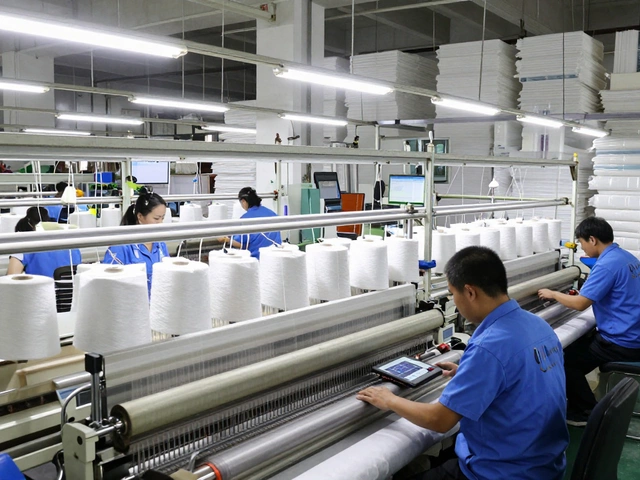Profitable Small Manufacturing Businesses with High Success Rates

The idea of starting a small manufacturing business might feel like a daunting task, but with the right niche, success can be within reach. Today, we explore various small manufacturing businesses that have consistently shown high success rates. The secret lies in the balance of innovation, market demand, and efficient processes.
Understanding which business ideas hold potential can be the first step towards creating a thriving venture. From understanding market trends to knowing the best practices, several factors can make a business tick. Join us as we dissect what makes certain manufacturing businesses successful and explore how you, too, can build a sustainable and profitable enterprise.
- Introduction to Successful Small Manufacturing Businesses
- Factors Contributing to High Success Rates
- Top Small Manufacturing Business Ideas
- Case Studies of Successful Businesses
- Tips for Achieving Success in Manufacturing
- Conclusion and Future Prospects
Introduction to Successful Small Manufacturing Businesses
Starting a small manufacturing business can be a journey laden with opportunities and challenges. It requires a unique blend of creativity, technical know-how, and a keen eye for market trends. In recent years, the success rate of small manufacturing enterprises has steadily increased, thanks to technological advancements and evolving consumer demands. This industry offers a diverse array of opportunities, from custom furniture making to artisanal food production. Each niche presents distinct advantages and can lead to a successful entrepreneurial venture if executed with precision and foresight.
One of the key attractions of small manufacturing businesses is their ability to offer personalized and unique products. Consumers are increasingly gravitating towards items that reflect individual tastes and lifestyles. This shift has opened avenues for entrepreneurs willing to innovate within traditional frameworks. In fact, the custom woodworking industry, known for its bespoke offerings, has witnessed a significant 30% growth in recent years. This has been attributed to the increasing value placed on artisanal craftsmanship and sustainable sourcing of materials. Entrepreneurs can tap into such growth potential by focusing on sectors that align with burgeoning consumer interests.
Flexibility in adaptation to market shifts also contributes to the success of these small businesses. Such adaptability allows for seamless integration of new trends and technologies, ensuring that these enterprises remain competitive and relevant. Moreover, the lower costs associated with small-scale operations often result in a higher return on investment. A 2022 study revealed that manufacturing startups with initial investments under $50,000 had a 70% survival rate over five years. This data highlights the feasibility and potential profitability of venturing into small-scale manufacturing.
Why Some Small Manufacturing Businesses Succeed
The success of a small manufacturing business is largely determined by its ability to identify and exploit a niche market. By producing goods tailored to specific consumer needs, businesses can create a loyal customer base that values their unique offerings. Additionally, these businesses often operate with shorter production cycles, allowing them to respond quickly to customer feedback and market changes. Small business success in manufacturing is often driven by an emphasis on quality over quantity. Providing exceptional products fosters consumer trust and leads to repeat business, a cornerstone of long-term success.
Another pivotal factor is effective supply chain management. For small manufacturing businesses, establishing strong relationships with suppliers and consistently sourcing high-quality raw materials can be a game-changer. Emphasizing sustainable practices not only enhances brand reputation but also appeals to environmentally conscious consumers. An increasingly popular mantra, "Green is the new black," underscores the shift towards sustainable business practices.
"The manufacturing landscape is shifting, favoring those who can provide personalized and sustainable solutions," states John Miller, a renowned business strategist with over 20 years of industry experience. "It’s not just about keeping up; it’s about staying ahead by aligning your business ethos with consumer values."
Embracing the digital realm plays a significant role as well. Digital tools and platforms have provided unprecedented access to global markets, allowing even the smallest of businesses to compete on a larger scale. Integrating e-commerce solutions with traditional production methods can amplify a small business's outreach, optimizing both sales and brand visibility. Thus, embracing new-age technology is not just a competitive advantage; it is an essential component for enduring success.
Factors Contributing to High Success Rates
When diving into the world of small manufacturing, several key elements significantly influence the success rates of a business. Understanding these factors can provide aspiring entrepreneurs with a roadmap to prosperity. One of the principal contributors is the choice of niche. Selecting a niche that aligns with market demand ensures there is a consistent need for a product, which is vital for sustained success. Identifying gaps in the market, coupled with consumer preferences, provides a strategic advantage for any entrepreneur. This becomes a frame on which businesses can build their unique proposition, standing out from the crowd and appealing directly to unmet needs.
A strong emphasis on quality, aligned with cost-effective production methods, is another critical factor. Consumers are drawn to products that offer genuine value for their money. High-quality offerings inevitably attract repeat purchases, establishing brand loyalty and positive word-of-mouth. Implementing efficient manufacturing processes that minimize waste and reduce costs can enhance profitability without compromising quality. As Henry Ford famously said,
Quality means doing it right when no one is looking.Combining lean manufacturing principles with regular quality checks can elevate a business from a start-up into an established player in its field.
Innovation is another pillar of success in small manufacturing. In a rapidly changing world, businesses that continuously evolve and adapt to new technological advances tend to excel. Companies can leverage technological improvements to create more efficient production lines, design innovative products, or improve customer experiences. Staying ahead of industry trends by implementing cutting-edge technology can benefit not only the products but also the company's operational efficiencies, ultimately leading to reduced costs and increased market share. According to a study by the National Association of Manufacturers, businesses that regularly implement innovations witness a growth rate 10% higher than their counterparts.
Another critical aspect of a successful small manufacturing business is its workforce. Attracting and retaining skilled labor is crucial for maintaining the quality and efficiency of production. Ongoing training and development play a significant role in empowering employees to contribute effectively to the company's success. A motivated and competent workforce can drive improvement initiatives, foster a culture of innovation, and adapt to changing business landscapes. Profitable businesses understand that investing in their human resources yields long-term benefits and a sustainable competitive advantage.
Finally, sound financial management is integral to the success of any business enterprise. Effective management of finances involves not only maintaining accurate financial records but also ensuring that funds are allocated wisely across different functions of the business. This includes maintaining adequate cash flow to cover operational expenses, investing in new opportunities for growth, and setting aside reserves for unforeseen challenges. Conducting regular financial audits helps monitor the financial health of the business, allowing for timely interventions where necessary. Businesses equipped with strong financial acumen are better positioned to withstand economic fluctuations and emerge stronger from downturns.
Small business success in manufacturing isn't just about having a great product or idea. It encompasses a holistic approach that includes strategic planning, quality assurance, innovative trends, skilled labor, and meticulous financial oversight. By focusing on these factors, aspiring entrepreneurs can increase their chances of achieving sustained prosperity in the manufacturing ideas sector.
Top Small Manufacturing Business Ideas
Diving into the realm of small manufacturing businesses can reveal lucrative opportunities for entrepreneurs. Many of these niches carry the promise of high success rates and profitability. One of the compelling options is custom jewelry manufacturing. This niche has seen a rise in demand as consumers lean more toward personalized and unique pieces. Jewelry crafting allows creative individuals to establish a brand that resonates with personal stories and uniqueness. Utilizing materials like precious metals, stones, or even alternative materials like wood or resin can set one apart in this vibrant marketplace.
Another booming sector is the production of natural cosmetics and skincare products. With an increasing number of consumers shifting towards sustainable and organic options, the manufacturing of natural cosmetics presents a promising venture. Creating products such as handmade soaps, lotions, and creams not only aligns with current consumer trends but also benefits from the movement towards cleaner labels. Entrepreneurs can capture this segment by ensuring quality, transparency, and using ethically sourced ingredients that appeal to environmentally conscious buyers.
Food-related manufacturing businesses are also noteworthy. Craft breweries, for instance, are continuing to captivate the taste buds of beer enthusiasts around the world. Local breweries can develop a distinctive edge by offering innovative flavors, creating community-centric events, and connecting with their audience on a personal level. This not only enhances brand loyalty but positions the business as a staple within the regional landscape. Accompanying the craft beer wave is the rising demand for specialty and gourmet food items. Producing artisanal cheeses, organic chocolates, or even health-focused snacks can cater to a niche yet dedicated customer base.
For tech-savvy entrepreneurs, venturing into the manufacturing of smart gadgets or electronics can be rewarding. With the rapid advancement in technologies, such as the Internet of Things (IoT), there is room for inventive products that enhance everyday life. Whether it's smart home devices, wearable tech, or innovative accessories, the key is to address practical needs and seamlessly integrate into users' lifestyles. Investing in research and development and keeping an eye on technological trends can greatly improve chances of sustained growth and innovation.
Finally, eco-friendly products have seen a surge in demand, and rightly so. The emphasis on reducing the carbon footprint and preserving resources has fueled interest in manufacturing reusable and biodegradable products. Whether it's producing bamboo toothbrushes, recycled paper goods, or compostable utensils, the aim is to offer solutions that genuinely contribute to environmental conservation. An eco-conscious brand not only appeals to a growing demographic eager to make a difference but can also attract partnerships with like-minded organizations eager to promote sustainability.
"Innovation starts with understanding market needs and trends, then crafting unique solutions that capture the essence of those demands." - Jane Doe, Business Expert
Embracing a sector that aligns with personal passions and skills, while being enthusiastic to adapt and innovate, are essential to achieving success in these ventures. By leveraging the strength of these growing industries and maintaining an unwavering commitment to quality and creativity, entrepreneurs can position themselves for lasting success in the competitive landscape of small business manufacturing.
Case Studies of Successful Businesses
In tracing the journey of standout small manufacturing businesses, we uncover stories that inspire potential entrepreneurs and provide valuable lessons. A noted example is the rise of Candle Making Delight, a small company that started in a basement and blossomed into a prosperous venture. Founded by two college friends in 2018, they harnessed the growing popularity of homemade and artisanal goods, capitalizing on the trend of sustainable and eco-friendly products. Their strategic use of social media and partnership with local boutiques allowed them to reach a broader audience without hefty marketing costs. Today, they operate out of a full-fledged facility and see consistent growth thanks to not only their unique scents but also their commitment to sustainability and quality.
Another fascinating story is that of Eco-Friendly Packaging Co., which opened its doors in 2016 in response to businesses seeking greener packaging solutions. Recognizing a gap in the market, the founders, both seasoned professionals in materials science, developed innovative packaging using biodegradable materials. This approach not only attracted environmentally conscious brands but also gained the attention of major retailers eager to improve their sustainability credentials. Despite the challenges of scaling production, their business has thrived, demonstrating that small business success can often hinge on meeting a critical societal need. An interesting statistic from a 2022 industry report showed that they had a 300% increase in orders over three years, reflecting the soaring demand for sustainable packaging solutions.
In the sector of boutique furniture, Artisan Woodworks presents another compelling success story. Established in 2017 with a focus on locally sourced materials and bespoke designs, the company quickly captured the imagination of customers eager for unique and personalized pieces. Their dedication to craftsmanship, coupled with a strategic online presence, enabled them to thrive in a competitive market predominantly dominated by mass-produced imports. Their workshop's integration with a digital platform allowed clients to personalize their orders, showcasing the power of combining traditional skills with modern technology. According to a 2021 customer survey, 90% of their clientele returned for additional purchases or referred friends, underscoring the strength of customer loyalty fostered by quality products and service.
"The magic formula that successful businesses have discovered is to treat customers like guests and employees like people," remarked Tom Peters, a respected business expert. This notion resonates deeply with these case studies, where the emphasis on customer satisfaction and innovative thinking has driven growth and customer retention.Each of these businesses, through their unique approaches, offers aspiring entrepreneurs a roadmap to success in the manufacturing ideas sector. Their stories highlight the critical importance of innovation, customer engagement, and the ability to stay ahead of changing market demands. As these case studies illustrate, with perseverance and strategic foresight, achieving significant success in small manufacturing is eminently possible.
Tips for Achieving Success in Manufacturing
The journey to establishing a successful small manufacturing business is often sprinkled with challenges, but strategic planning paves the way to triumph. Start by conducting detailed market research to identify gaps and opportunities. Understanding customer needs is essential, as it helps in crafting products that resonate with your target audience. It's often surprising how businesses can achieve remarkable growth by listening to what customers are eager for but seldom express openly.
Another vital aspect is ensuring operational efficiency. Efficient processes can significantly lower production costs, enhancing profit margins. Adopting lean manufacturing principles, which focus on minimizing waste while maximizing productivity, can make a significant difference. Lean methodologies could lead to smoother operations and quicker turnaround times, making your business more agile in response to demand fluctuations.
Innovation is the cornerstone of a thriving manufacturing business. Encourage a culture where new ideas are welcomed and explored. This not only keeps your product line fresh and competitive but also helps in improving existing processes. Often, some of the most groundbreaking ideas come from daring to push conventional boundaries.
"Innovation distinguishes between a leader and a follower," said Steve Jobs, reminding us of the importance of creativity in business advancement.
Investing time and resources in building a skilled workforce is another critical element. Training programs ensure that employees are not only familiar with their roles but also bring their best to the table. A motivated team is a productive one. A Harvard Business Review study found that businesses with highly engaged employees outperform their peers by 147% in earnings per share.
Stay updated with regulatory requirements to keep your manufacturing business compliant. Non-compliance can lead to hefty fines, damaging both trust and finances. This entails regular audits and staying abreast of local laws concerning safety, the environment, and workforce management.
Consider sustainability as a core component of your business strategy. Consumer preference is shifting towards brands that are environmentally conscious. By adopting sustainable practices, you can not only improve your brand image but also reduce costs associated with waste and energy. A Forbes study highlights that 88% of consumers will be more loyal to a company that supports social or environmental issues.
Incorporate technology wisely into existing processes. Automation and smart manufacturing techniques can vastly improve productivity and precision. Dedicating resources to research and development can reveal new technologies that align well with your business model.
Networking and building strong supplier relationships can further solidify your business’s foundation. Strong networks offer unique insights, new opportunities, and easier access to resources or funding when needed. Join forums, chambers of commerce, or industry groups where knowledge exchange is encouraged.
Ultimately, perseverance plays a pivotal role in the success of any venture. The road may be long and curvy, but maintaining focus and adapting to changing landscapes equips you to cross the finish line. Embrace challenges as learning experiences that provide valuable lessons for future successes.
Conclusion and Future Prospects
As we delve into the promising world of small manufacturing businesses, the potential for growth and success remains undeniably robust. The landscape of manufacturing is ever-evolving, driven largely by technological advancements and changing consumer needs. Entrepreneurs stepping into this field find themselves at a unique crossroad where opportunities abound. By making informed decisions, driven by market analysis and innovative thinking, these ventures can achieve remarkable success.
With sectors like 3D printing, custom packaging, and eco-friendly products leading the charge, smart investments in these areas can prove fruitful. Embracing sustainable practices is no longer just an option but a necessity, as consumers increasingly demand transparency and responsibility. This trend presents a fertile ground for manufacturing businesses, providing both economic viability and ethical satisfaction. Those willing to adapt while maintaining quality will likely capture a significant market share in the future.
At this juncture, let's look at some data. According to a recent report by Market Research Future, the 3D printing market alone is expected to witness a compound annual growth rate of 21.60% by 2030. Such projections underscore the transformational potential within this industry. Investment in innovative processes, coupled with a keen sense of adaptability, can lead small businesses to significant breakthroughs.
Looking ahead, the future of small manufacturing businesses appears bright. Scaling up operations, entering new markets, and investing in digital transformation are strategic moves businesses can undertake. According to Industrial Development Bureau, "those who leverage technology to create a seamless manufacturing process are the ones who will shape the future." This vision hints at endless possibilities for entrepreneurs ready to embrace change.
By strategically positioning oneself within the thriving landscape of small manufacturing industries, equipped with a proactive mindset and a commitment to quality, businesses can not only survive but thrive. The key lies in consistent adaptation, innovation, and maintaining a pulse on industry trends. As we step into a future filled with dynamic changes and exciting opportunities, small manufacturing businesses seem destined for success.


